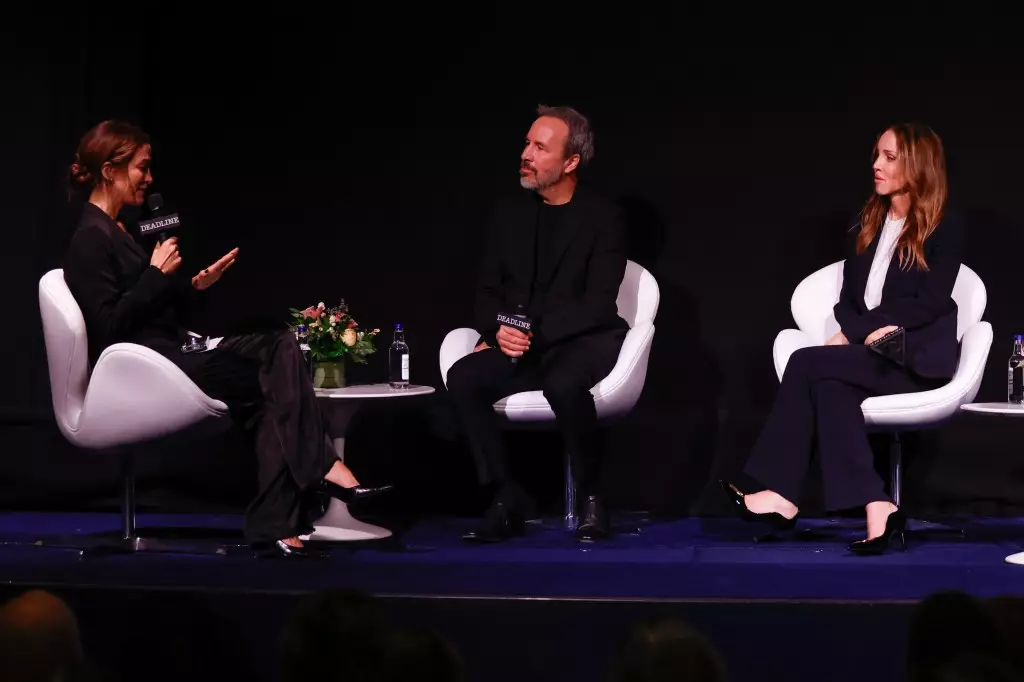The cinematic world of Frank Herbert’s “Dune” has long captivated audiences with its complex narrative and rich symbolism. With the release of “Dune: Part Two,” director Denis Villeneuve, along with producers Mary Parent and Tanya Lapointe, dived deep into the intricacies of this legendary universe in a recent panel discussion at Contenders London. Their insights not only illuminate the film’s artistic choices but also reveal the underlying social commentaries that are as relevant today as they were in the 1960s when Herbert penned his original tale.
Villeneuve emphasized his commitment to remaining faithful to Herbert’s vision. By presenting a cautionary tale that warns against the dangers of charismatic leadership and the mixing of religion with political power, the film invites the audience to reflect on contemporary societal dynamics. Villeneuve’s interpretation suggests that the issues Herbert anticipated regarding the human experience—such as the exertion of power and the relationship between humanity and the environment—continue to resonate in modern times. Through the character of Paul Atreides, portrayed by Timothée Chalamet, viewers witness a young man grappling with his destiny in a landscape fraught with peril and betrayal.
The film embodies the trials faced by Paul as he seeks vengeance against those who decimated his family, but at its core is a narrative about growth, responsibility, and self-discovery. This duality enriches the storytelling and provides audiences with layers of meaning to unpack.
One of the most significant elements that emerged from the panel discussion is the central love story between Paul and Chani, played by Zendaya. Parent articulated that, despite the sprawling conflict and political intrigue, the heart of “Dune: Part Two” revolves around love as a grounding force amidst overwhelming strife. Both Villeneuve and Parent elaborated on how this young couple navigates a world filled with challenges and moral questions. Their relationship stands as a testament to resilience, allowing the audience to connect emotionally with the characters as they traverse a universe marked by violence and upheaval.
In a landscape where love often feels overshadowed by power struggles, the film’s focus on Paul and Chani’s emotional journey underscores the idea that human connections can provide hope and strength. Villeneuve hinted at the tragic implications of their love, framing it within the context of leadership and sacrifice. This adds a poignant layer to the narrative, complicating the archetypal quest for revenge with personal stakes that resonate with viewers.
Another compelling aspect of “Dune: Part Two” is its exploration of power dynamics, particularly through the lens of its female characters. Producer Lapointe highlighted how the film meticulously presents the concept of power as a long-term game rather than a short-term maneuver. This nuanced understanding of power is encapsulated in the portrayal of the Bene Gesserit and their intricate manipulations of socio-political landscapes. Villeneuve’s approach to female agency within the film is also notable, as he engaged in extensive discussions about ensuring that each female character possesses her own distinct agenda and complexity.
Lady Jessica, a pivotal character who belongs to the Bene Gesserit, embodies this theme of agency, illustrating how women in the narrative are not merely passive figures but active players in their own stories. Such depth enhances the film’s thematic richness and reflects contemporary discourse around gender roles in society.
As Villeneuve playfully speculated about a potential third installment, he underscored how the ongoing narrative could further delve into the themes of war and struggle. “In order to save his friends, he has to start a war,” he suggested, indicating that future explorations may focus on the moral dilemmas of leadership and the sacrifices involved in conflicts. There is an anticipation for how these themes will continue to unfold, as well as the filmmaker’s drive to remain faithful to Herbert’s intricate world.
Overall, “Dune: Part Two” stands not just as an action-packed cinematic experience, but as an intricate tapestry of thematic explorations—ranging from love and agency to power and moral complexity. The collaborative efforts of Villeneuve, Parent, and Lapointe have resulted in a film that not only entertains but also provokes meaningful reflection on timeless human issues. As audiences immerse themselves in this compelling universe, they are invited to engage with the narrative’s rich layers, prompting introspection about their own values and societal structures.

Leave a Reply